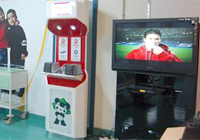 With support from UNAIDS, 2 public service
With support from UNAIDS, 2 public service
announcements broadcast in English,
French and Chinese are being shown in
waiting area in Olympic Polyclinic. These
feature German soccer player and UNAIDS
Special Representative Michael Ballack,
and Chinese Basketball player Yao Ming.
Credit: UNAIDSAs part of a joint HIV prevention campaign, some 100,000 high-quality condoms are being made available to athletes free of charge in health clinics in the Olympic Villages of Beijing, Qingdao and Hong Kong. Athletes are also able to find useful information on HIV from thousands of posters and leaflets in English, French and Chinese.
In the waiting room of the polyclinics, HIV prevention videos with UNAIDS Special Representative and German footballer Michael Ballack and Chinese basketball star Yao Ming are being shown in three languages. In addition, all athletes competing in the 2008 Olympic Games have received flash sticks that include fact sheets on HIV.
These HIV prevention and anti-discrimination efforts are part of the 2008 Olympics HIV campaign “Play safe – Help stop HIV” launched by UNAIDS, International Olympic Committee (IOC), and the Beijing Organizing committee of the Olympic Games (BOCOG). The objective of the campaign is to educate athletes participating in the Beijing Games about HIV and encourage them to be ambassadors of AIDS response.
 IOC President, Dr. Jacques Rogge (left)
IOC President, Dr. Jacques Rogge (left)
greets Dr. Bernhard Schwartländer, UNAIDS
Country Coordinator (centre) during the
launch of the Beijing Olympics HIV and
AIDS Campaign "Play safe – Help stop HIV".
Credit: UNAIDS “Athletes should know about how HIV can be transmitted, how it does not transmit and how HIV can be prevented. This will help them educate their peers and fight discrimination against people with HIV. It really is a topic relevant to sport,” said Campaign Ambassador and Egyptian swimmer Rania Elwani.
The campaign not only aims to benefit the many athletes taking part but also members of the national delegations and the more than 100,000 volunteers.
Today about 33 million people are living with HIV worldwide. Young people, 15–24 years of age, account for around 45% of all new HIV infections in 2007. However, many young people still lack accurate, complete information on how to avoid exposure to the virus.
Many young people are involved in sport, either as spectators or participants. Through this global sport gala of the Beijing Olympics, messages about AIDS can reach out to communities, especially to youth, to promote safer sexual behavior and to stop stigma and discrimination.
 The objective of the 2008 Olympics HIV
The objective of the 2008 Olympics HIV
campaign “Play safe – Help stop HIV” is to
educate athletes participating in the
Beijing Games about HIV and encourage
them to be ambassadors of AIDS response.
Credit: UNAIDS“Famous athletes can play an important role to bring across messages about HIV prevention, care and support as they are regarded as role models by young people," said IOC President Jacques Rogge. UNAIDS Country Coordinator Dr Bernhard Schwartländer said, “We know that sport and the Olympic Games are universal languages that can play a very important and positive role in raising AIDS awareness and reducing stigma and discrimination of people living with HIV.”
In 2004, UNAIDS signed a Memorandum of Understanding with the IOC, combining efforts to enhance the role of sports organization in the AIDS response at community and national levels, and to organize AIDS awareness activities with coaches, athletes and sport personalities.






